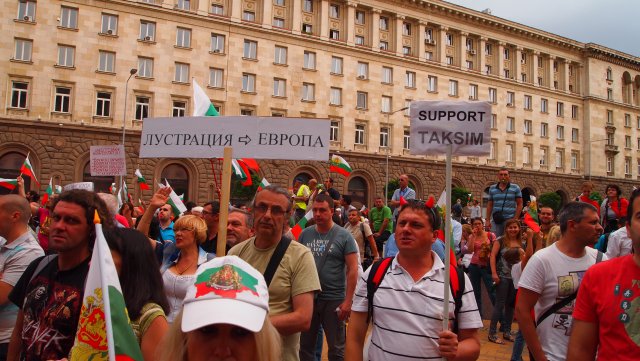
Bulgarians voted for a new parliament on May 9, two months ahead of schedule. It came after mass protests against poverty and economic disadvantage forced the centre-right Citizens for European Development of Bulgaria (GERB) government to resign.
The elections, however, reflected a polarised political landscape and one devoid of left forces. GERB received most votes with 30.71% (97 seats). The second-largest party, the Bulgarian Socialist Party won 27.02% (84 seats). The 2005-09 BSP government was marked by neoliberal policies and corruption scandals.
The Turkish and Muslim minority representative party Movement for Rights and Freedoms (DPS) won 10.59% (36 seats) and the right nationalist party Ataka (“Attack”) won 7.38% (23 seats).
Despite GERB winning the most votes, against the backdrop of anti-government protests it was unable to find partners to form a coalition government.
A new government was formed by an unlikely and highly fragile coalition of the BSP and DPS, relying on the support from Ataka, a natural ideological enemy of the DPS, to reach quorum. The two coalition parties have a total of 120 seats, one short of the number needed for quorum in the 240-seat parliament.
GERB is boycotting proceedings and is only willing to attend if electoral law changes are discussed.
On May 29, financial expert and former finance minister Plamen Orescharski (dubbed “Bulgaria's Monti”) was elected prime minister.
Two weeks after a new government was formed, a protest movement began in Bulgaria's capital, Sofia. The protests were triggered by the appointment of a media giant, Deljan Peewski, as chair of the State Agency for National Security (DANS).
Peewski comes from a family that controlled Bulgaria's biggest newspaper and television company and is one of the nation's richest people.
Despite the government reversing the decision and publicly apologising, the demonstrations continued. July 4 marked the 21st day of continuous protests. Every day at 6.30pm, up to 10,000 protesters gather in front of the cabinet building in Sofia and march through the streets.
Compared to the protests against the GERB government, the latest wave has a middle-class character, has generally been peaceful and family based, and largely organised via social networking.
The occasional hurling of food or the dousing of ministers with water stand in stark contrast to the seven people who set themselves on fire in February.
Eurostat figuresd from 2011 showed 45.2% of Bulgarians were at risk of poverty. Social exclusion of the elderly was as high as 61.2%. The government program is a neoliberal economic plan.
However, the focus of the demonstrations is not economic. As well as calling for the cabinet's resignation and new elections, the protesters want to revise the election code to allow newer parties to challenge the political status quo.
Protesters have called for more transparency, an end of corruption, an end to the ties of Bulgarian politicians to businessmen and organised crime, and to improve the independence of the courts.
Reinforcing this mood, 60 prominent Bulgarian intellectuals, lawyers, journalists and human rights activists posted a “charter for disbanding the plutocratic model of the Bulgarian state” on the internet, calling for an end to rule by the wealthy and a restoration of democracy and the rule of law.
The government has no intention of bowing to protester demands, saying new elections would wreck political stability and damage the European Union's poorest member state as it seeks to emerge from a deep recession.
Dr Krassimir Kanev, chair of the human rights NGO Bulgarian Helsinki Committee, spoke to Green Left Weekly about the political situation.
Kanev noted the legitimate demands of the middle-class protest movement against appointments of people representing wealthy business interests and organised crime, to ministerial positions.
At the same time, Kanev pointed to some concerning aspects of the movement, such as anti-Muslim overtones. For instance, protesters have opposed the appointment of a DPS Muslim member to a ministerial post.
Also, Kanev added the “unacceptable” use of “hate propaganda against political opponents, in Sofia one of slogans for instance is Red trash”.
Commenting on the protest movements' likelihood of success, Kanev highlighted the lack of political options available.
He believes that, due to the fragility of the coalition government and its reliance on the right nationalist vote, the protests will eventually succeed. But he said in the event of new elections, the same parties would likely win again, possibly with a slightly larger margin to ensure quorum.
Kanev predicted that Ataka would lose votes if elections were held now, as they are seen as traitors for supporting a coalition with the DPS. However, he said these votes would likely flow to parties even further to the right.
When asked about the existence of any party to the left of the BSP, Kanev resounded with a definite “No”. Kanev highlighted the importance of the NGOs in supporting the progressive demands of the movement on the one hand, but also highlighting non-progressive aspects.
“We protested against the slogans against minorities through public statements and these were successful,” Kanev said. “At the start there were many anti-Turkish sentiments among the protesters and now there are more messages about tolerance.”
It is only a question of time before the Bulgarian government will fall. The middle class has grown in economic strength since the end of the Stalinist era, but it lacks in political power. It remains unclear, in the absence of any new group, which party would be able to meet their demands.
“The middle class does not see itself represented in the government,” Kanev said. “The protests are after work, there are very few people from the minorities, no unemployed, so this is mostly a middle-class membership.”
